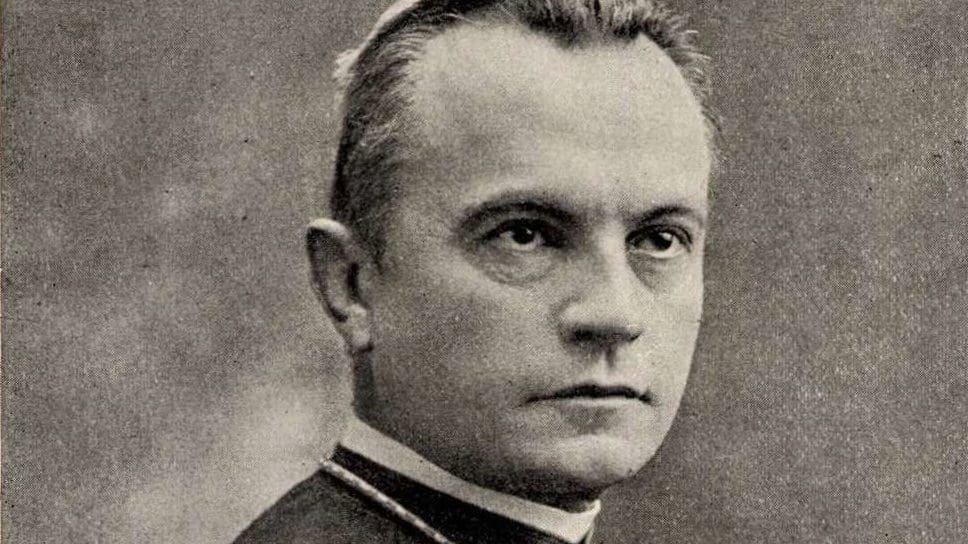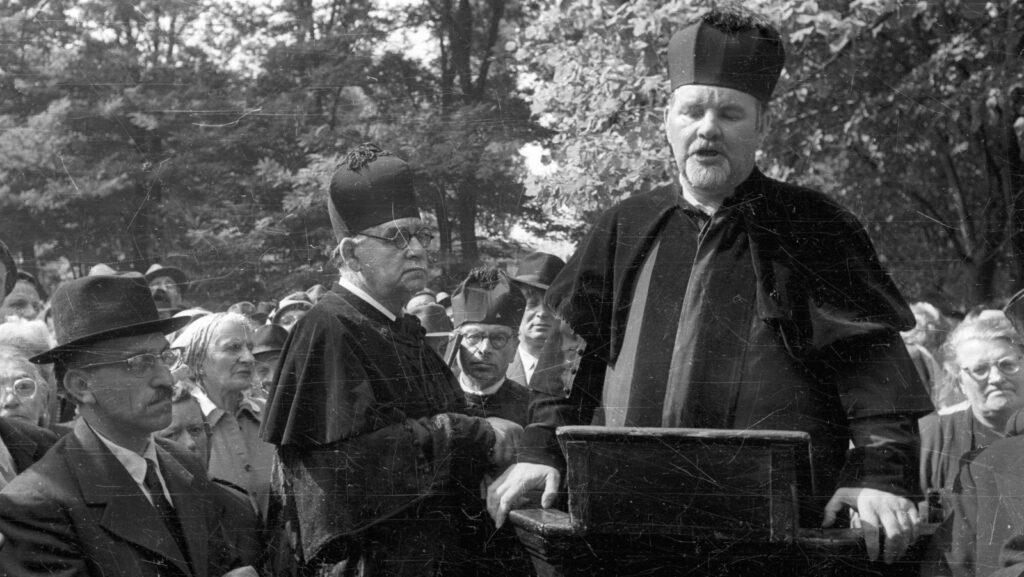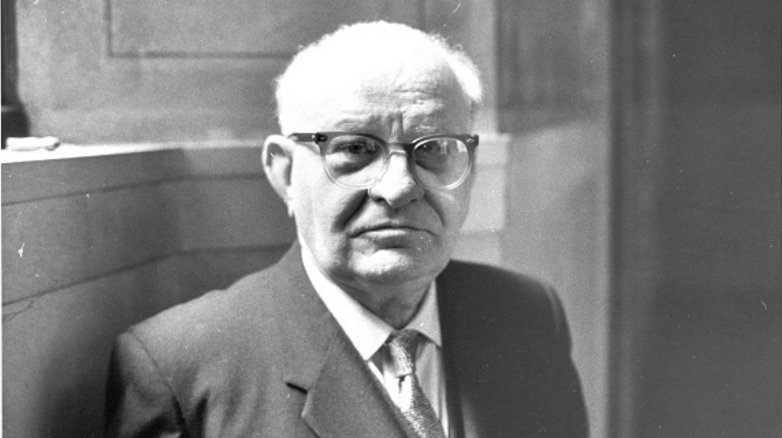One of the main reasons that Catholic bishop Ottokár Prohászka’s legacy is so debated today is his coining of the word “hungarizmus” (Hungarianism), an expression later taken over by the Arrow Cross (that is, the Hungarian pro-Nazi far-right which took over the control of the country between October 1944 and the conquest of the Soviet Red Army). Even though Prohászka died in 1927, and therefore had little to do with the Holocaust or the Arrow Cross, the coinciding phrasing still tarnishes his historical memory. In this piece, I will present an interesting albeit largely forgotten debate that raged in the early ‘40s about Prohászka’s legacy and the expression Hungarianism.
Lajos Makray, a Catholic priest and pro-Habsburg parliamentary representative, observed correctly that ‘we can say about the works of Ottokár Prohászka that this is the book in which everyone finds a justification of their own dogmas.’[1] A good example is the fact that the name of Prohászka was cited not only by the Arrow Cross, but also by their opponents: the Jewish socialist Manó Buchinger, the smallholder Béla Varga, liberals Rupert Rezső and Károly Rassay, and the Christian socialist Béla Bangha, József Közi-Horváth or István Lendvai – they all opposed the Arrow Cross and cited the bishop’s writings to justify their own position.[2]
The issue of racial antisemitism was the most important topic of discussion for the two camps of Prohászka’s supporters
The latter two writers argued in favour of a “real” Hungarianism, free from the direction of the Arrow Cross, and Lendvai called the reference to Prohászka a ‘completely unjustified attempt’ on the part of the Arrow Cross men. According to him, collectivism overriding the individual, the principle of self-interest of the state, the omnipotence of blood, and racial antisemitism were not part of Prohászka’s world of thought. Typically, the issue of racial antisemitism was the most important topic of discussion for the two camps of Prohászka’s supporters. This is perfectly illustrated by the exchange of words that took place in the parliament between the aforementioned Lajos Makray and the Arrow Cross politician Károly Maróthy-Meizler. Makray, standing on the basis of religious antisemitism—which is of course no more acceptable—argued that the Jews must be converted, supporting this position with Prohászka. According to the parliamentary minutes (with the name of the speaker written in bold text):
‘Makray: I have the honour to refer [Maróthy] to Ottokár Prohászka. I am in the pleasant position that I not only know all of Prohászka’s works, but have also studied them (Károly Maróthy: We have done that, too.); I have listened to Prohászka quite often (Károly Maróthy: We have done that, too.), as a result, I know Prohászka’s spirituality, (Károly Maróthy: We do, too.), the spirit of Prohászka, which is called upon by people to help justify their own position with a leaning that is diametrically opposed to Prohászka’s perception’.[3]
Makray quoted Prohászka as saying that ‘there are many, many elements in Judaism that are not Jewish at all, and we have to facilitate their coming over to Christianity. We have to open an evangelizing school for women and men, we have to hold missions for them and we have to take them in and keep them with great love in the bosom of Christianity and Hungarianness.’ The pro-Nazi Maróthy, however, attacked this argument by saying that the quote comes from 1918 and that the bishop already stated otherwise in his later writings:
‘Károly Maróthy: The representative referred to Prohászka, but my fellow representative knew very well from which date on we should quote Prohászka. I asked, in other words, which year Prohászka’s quote was from. He answered: from 1918. My colleague is absolutely right. Prohászka still had this position in 1918, but in the fall of 1918, during and after the Autumn Revolution, after the Red-Jewish-Bolshevist revolution, Prohászka changed his position and openly stated: I was wrong, the Jewish question is a racial issue. (That’s right! That’s right! – yelling on the far left side of the parliament.) So if you want to quote Prohászka in good faith, you must quote Prohászka’s work on the Jewish question from 1919, in which he says that it is indeed a racial issue that cannot be solved by baptism. (Lajos Makray: I deny it!) There’s no use denying it.’[4]
Maróthy did not quote Prohászka verbatim, but the bishop did publish an article in 1919 in which he defined his anti-Semitic views on a racial basis. Then again, two years later, the bishop spoke again of the need to convert Jews.[5]Prohászka’s anti-Nazi supporters therefore primarily quoted from their idol’s more tolerant writings, ignoring the more antisemitic parts (for example, his 1893 article, in which he calls the Jews an “ulcer” gnawing at the bones of Hungarians.)[6] Of course, it is questionable whether they were at all interested in Prohászka’s antisemitism, since the anti-Nazi Christian Socialists were not separated from the Arrow Cross by some kind of philosemitism, but rather by their opposition to racial ideology denying baptism and their pro-German orientation.
What is certain; however, is that precisely in the discussion of anti-Jewish laws and antisemitism in general, pro-Nazis and anti-Nazis both liked to draw on Prohászka’s work. As early as 1933, Zoltán Meskó, a National Socialist and later a member of the Arrow Cross Party, defined the source of his worldview as follows: ‘We, National Socialists [. . .] are following Ottokár Prohászka [. . .] [who] pointed out the excesses of liberalism, internationalism and Judaism. They used to say that Judaism is leaven and leaven is needed. It’s fine, leaven is necessary in bread, but if it continues like this, we will finally be eating leaven instead of bread.’[7] The already mentioned Károly Maróthy stated directly in connection with the first anti-Jewish law of 1938 that it realized the idea of Prohászka:
Pro-Nazis and anti-Nazis both liked to draw on Prohászka’s work
‘Károly [Maróthy-]Meizler: We say that the current understanding of the Jewish question is a great satisfaction for the spirit of Ottokár Prohászka [. . .] because yes, Prohászka was the spiritual guide of the Christian worldview, Prohászka was the one who wanted to solve social problems with actions immediately after the Communist period [of 1919 . . .] he was the one who stood up and urged an institutional solution to the Jewish question [. . .] what he called Hungarianism [. . .]’.[8]
The Nemzet Szava (Word of the Nation) Arrow Cross newspaper wrote after the ten-year anniversary of Prohászka’s death in an aptly named article entitled ‘Our Hate’, that they were not the first to call attention to the Jewish danger. ‘We didn’t establish this, Ottokár Prohászka already established it: “Jews are a foreign power suppressing Christianity, occupying our country, expropriating us.”’[9] However, it should be noted that not a single instance of Arrow Cross leader Ferenc Szálasi quoting Prohászka is known. This does not mean that a quote like that could not emerge in the future, but apparently the very leader of the Arrow Cross did not find it important to quote the bishop or to even trace back the word Hungarianism to him. (The expression, by the way, was used by other extremist groups as well, also during the lifetime of Prohászka, but unrelated to the bishop.)[10]
However, followers of Prohászka rose on the other side as well. Perhaps no one defended more strongly the memory of Prohászka against its unsolicited Arrow Cross following than the Christian Socialist—but strongly anti-Nazi—poet István Lendvai. Lendvai, who was no stranger to antisemitism in the early twenties, took a sharp anti-far-right turn in the mid-thirties and even sympathized with Social Democracy during his final years.
In a 1940 article written under his pseudonym “Nomád”, Lendvai attacked a layer who defended certain Arrow Cross men at a penal trial by claiming that ‘the spirit of Prohászka is today represented by the Arrow Cross Party.’ In reply, Lendvai cited the fact that he was a good friend of Prohászka – in fact, Prohászka ordained Lendvai’s wedding – and he knew the bishop’s views well. ‘[The lawyer’s words] were bold and nasty lies’, and ‘I’d file a police report for the tarnishing of the name of a dead person’ if the speaker was not a lawyer himself. Lendvai declared that he and his colleague at the anti-Nazi Magyar Nemzet newspaper were all followers of Prohászka. ‘[Prohászka’s] soul was characterized, along with social sensitivity, by the freedom of the soul, opposition to all kinds of terror, and the full service towards Hungarian sovereignty.’
According to Lendvai, Prohászka ‘cannot be dragged down to the same level with those who would replace law with the law of the fist and the war of minds with brawling […]. [Prohászka] would be opposed to Arrow Cross terror today and would stand up against their aspirations which are foreign to the Hungarian mind. […] Take your hands off him!’[11] After the same event, priest Gyula Bejczy of Székesfehérvár also wrote an article, saying that ‘we cannot imagine Prohászka with any kind of party insignia’, and Lendvai cited this article approvingly in his on work.[12] The poet also expressed his view that Prohászka today would protest not against Marxism but ‘the men of the Andrássy Avenue 60’ – that is, the official address of the Arrow Cross Party.[13] Lendvai even wrote an article titled ‘Two Kinds of Hungarianism’, the one of Prohászka and the one of Arrow Cross leader Ferenc Szálasi. The Hungarianism of the former ‘did not sink into the grave with the body of the unforgettable bishop of Alba Regia [Székesfehérvár]. This Hungarianism still controls the pen and word of many of us’ on the side of the anti-Nazi camp.[14]
Lendvai; however, did not stop at praising Prohászka, but also fired a round of derogatory adjectives and terms at his Arrow Cross opponents, who in turn sued him and which case was concluded with a verdict against Lendvai.[15] Ironically, in reply, the pro-Arrow Cross press managed to dig up an old article by Lendvai in which the poet defended his own antisemitism via citing Prohászka.[16] Apparently, quotes can be used for many things, and even the same person can use a citation for different things depending on time and situation.
Prohászka served as an inspiration to right wingers both sympathetic to Nazism and the Arrow Cross and opposed to these ideologies
In summary, we can state that Prohászka served as an inspiration to right wingers both sympathetic to Nazism and the Arrow Cross and opposed to these ideologies. Prohászka was a man of many capabilities, who published entire volumes on various subjects, expressed numerous—and sometimes contradictory—views on different subjects, which could also change throughout his career. Everyone could find a quote that fit his worldview, and another citation could then be found to counter the previous one. It is impossible to say who was right, but the fact remains: in spite of the many antisemitic quotes readily available from Prohászka, Szálasi never quoted the bishop.
[1] Makray’s speech, dated 2nd June in: Képviselőházi napló, 1939. vol. XIII., 317. The quote in italics is from Swiss protestant theologian Samuel Werenfels.
[2] Buchinger Mangó for example quoted the bishop on democracy. See his speech dated 6th July 1933 in: Képviselőházi napló, 1931. vol. XVII., 570. Varga Béla cited Prohászka on 24th October 1939. See: Képviselőházi napló, 1939. vol. II., 394. Rupert quoted Prohászka as saying that the counter-revolutionary system was a „barrel without a bottom”. See: Képviselőházi napló, 1935. vol. XXII. 391. For Rassay’s speech, dated 29th November 1939, see Képviselőházi napló, 1939. vol. III., 511. For some of Lendvai’s articles: Szabadság, 24th April 1942.; Mai Nap, 26th May 1943. For Közi-Horváth, aside from his speech quoted below, see another speech of his dated 30th Novemner 1939 in: Képviselőházi napló, 1939. vol. III., 566. For Bangha see: Bíró Bertalan (ed): Bangha Béla SJ összegyűjtött munkái, vol. XXVIII. (Budapest: Szent István Társulat, 1942), 521-522.
[3] Makray’s speech, dated 2nd June 1942 in: Képviselőházi napló, 1939. vol. XIII., 317.
[4] Maróthy’s speech on the same day, in: Képviselőházi napló, 1939. vol. XIII. 319–321.
[5] László Bernát Veszprémy, ‘An Early Christian Zionist or a Sly Antisemite? Ottokár Prohászka on Zionism in 1921,’ Hungarian Conservative (16 July 2022), https://www.hungarianconservative.com/articles/culture-society/an-early-christian-zionist-or-a-sly-antisemite-ottokar-prohaszka-on-zionism-in-1921/ accessed 24 July 2022.
[6] Prohászka Ottokár, Iránytű, Budapest, Szent István Társulat, 1929, 1–2.
[7] Meskó’s speech, dated 12 May 1933, in: Képviselőházi napló, 1931. vol. XV., 365.
[8] Meizler’s speech, dated 31 March 1938, in: Képviselőházi napló, 1935. vol. XVII., 410–411.
[9] ‘A mi gyűlöletünk’, Nemzet Szava, May 1937.
[10] ‘Megalakult a Magyar Fascista Hungarista Tábor’, A Nép, 19 December 1922.
[11] Magyar Nemzet, 30 March 1940.
[12] As quoted in Magyar Nemzet, 17 November 1940.
[13] Magyar Nemzet, 25 January 1940.
[14] Magyar Nemzet, 19 September 1938.
[15] See the text of the verdict, also mentioning Prohászka: Magyar Nemzet, 24 January 1941.
[16] Magyarság, 9 May 1943.








